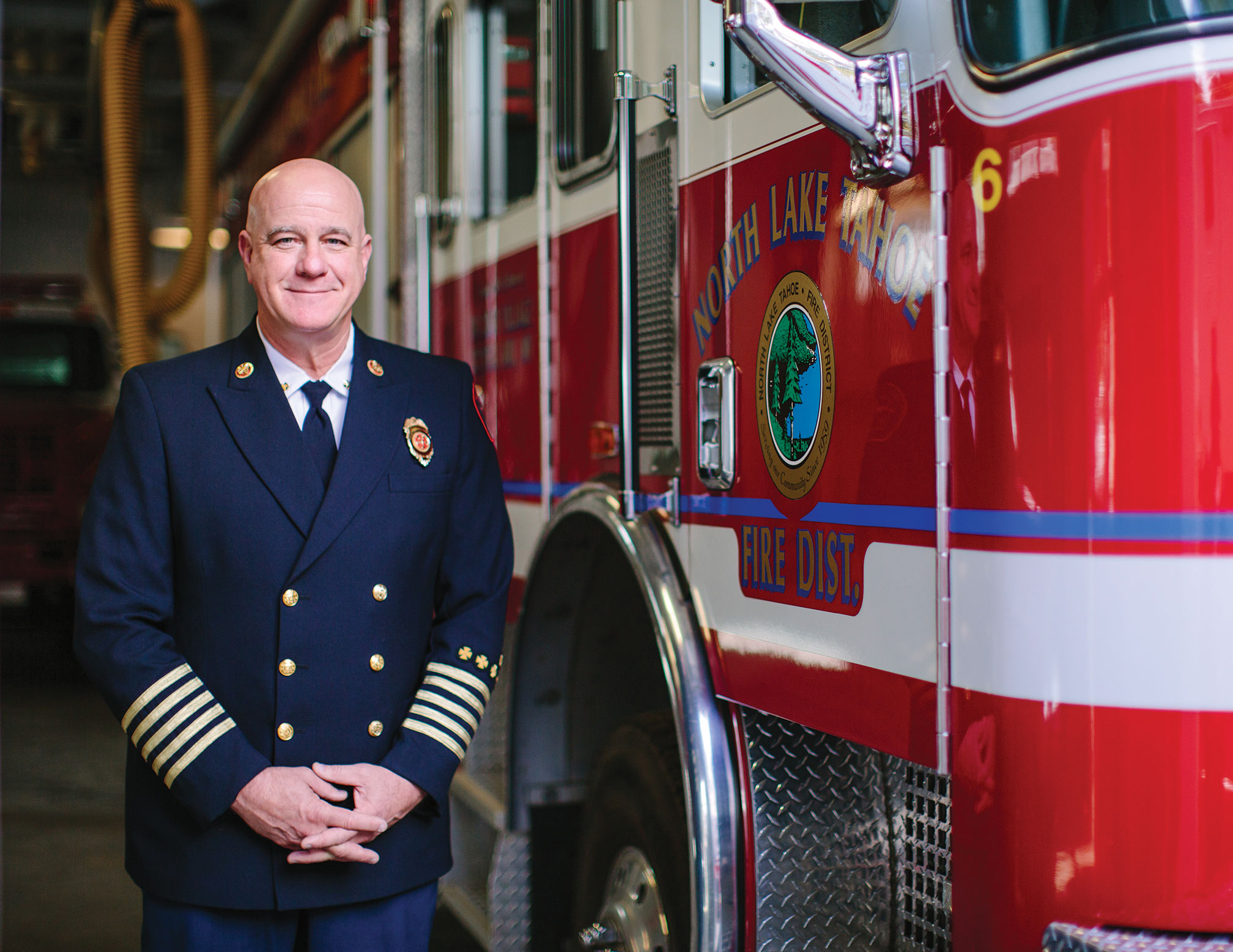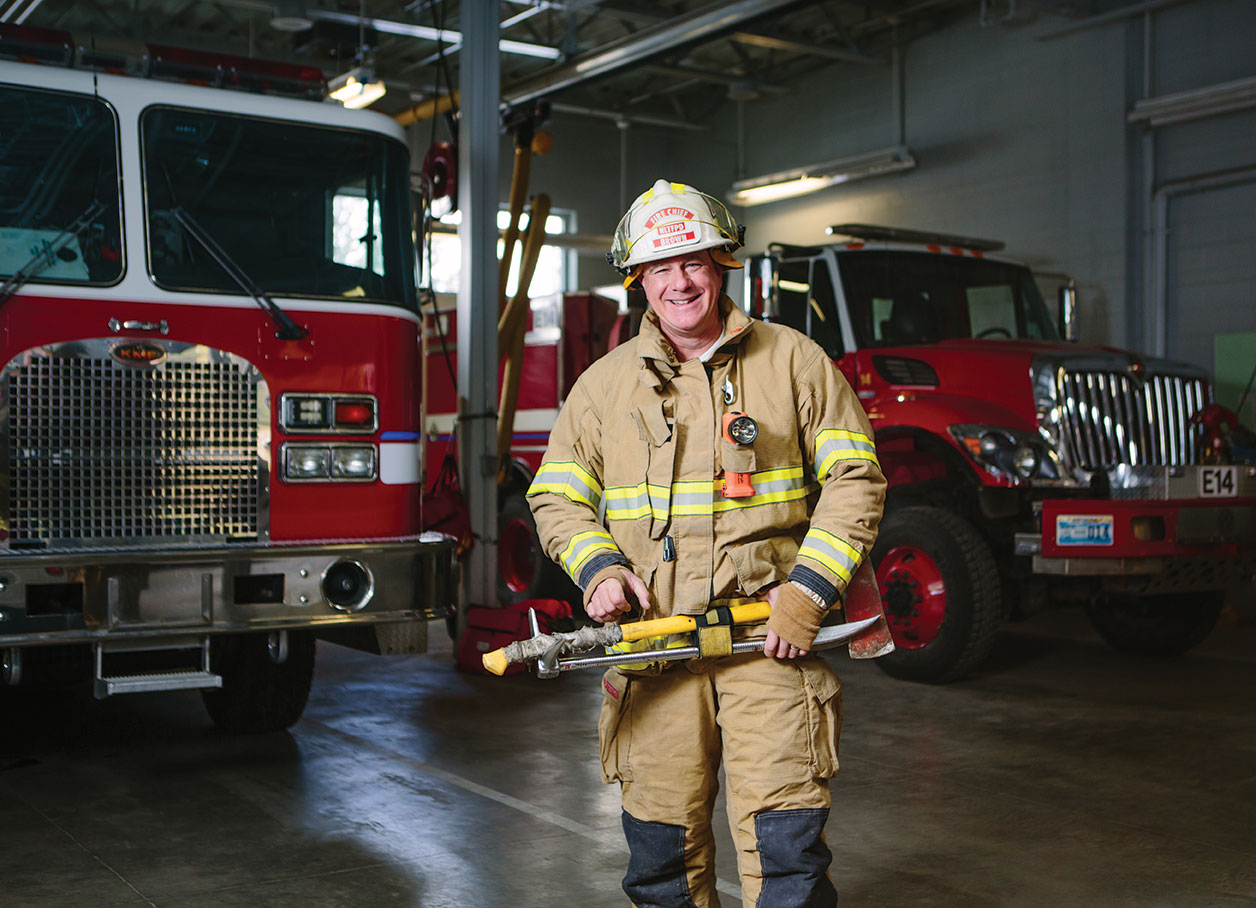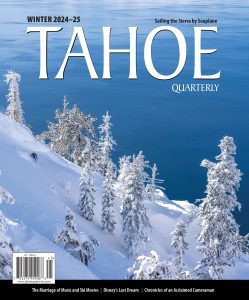
03 May Eye to Eye with Former North Lake Tahoe Fire Protection District Chief Mike Brown
After 26 years with the North Lake Tahoe Fire Protection District, Chief Mike Brown retired in March. Brown, who moonlights as a patroller at Mt. Rose Ski Tahoe, oversaw rapid growth in Incline Village/Crystal Bay and, crucially, served on a Blue Ribbon bi-state commission following the 2007 Angora fire tragedy in South Lake Tahoe as fire officials looked for ways to prevent such a disaster from happening again. Brown spoke with Tahoe Quarterly before stepping down.
What brought you into fire protection?
I lived in a small community in Northern California. While in high school I joined the volunteer fire department, got my Emergency Medical Technician (EMT) certification and was the only EMT they had there. I moved over to Reno and got hired by a private ambulance company. I joined the Truckee Meadows auxiliary firefighter program at the same time because I liked the fire business, and then I went to paramedic school and came back as a paramedic. When I got comfortable as a paramedic, I tested at several different departments and got a call from all of them at the same time, including here. I took the job here in 1986.
Will you stay involved locally?
Yeah, I’m not going far. What’s neat about the career I’ve chosen is that I can still do a lot of the things that I like doing; I just don’t have to be in charge. I can actually go back to being a firefighter, being a paramedic, and I enjoy that.
Is that the part of the career you love most?
Yes I do. This job as the fire chief has allowed me to do what I like doing. I still enjoy being a paramedic. I’ve been a paramedic for 35 years. I still enjoy getting on the ambulance with the crews here. We’ve got phenomenal people. They’re smart people. They’ve got a wealth of knowledge that they can supply me, and you know I have a little bit I can supply them too. Being a fire chief here, you’ve got to be a Swiss army knife. You’ve got to be able to fill a lot of positions.
What other positions have you had to fill?
I’ve traveled around the nation helping with large incidents, and not only fire. I’ve been in [the aftermath of] Hurricane Katrina. It provided me with an education that you just don’t get in schools. Our community here benefits from not only me being on these teams, but a lot of our people being on them.
We’ve done a lot of work with our fuels reduction program to help create a very safe environment, but we’re still susceptible to major wildland fires, earthquakes, floods and weather issues, and so this community has got to be ready. By going out and working on these larger incidents we bring back a lot of that knowledge that we’re able to use here. Our evacuation program for Incline Village/Crystal Bay came out of a piece of literature I picked up when I was at Hurricane Katrina. We’re susceptible to the same thing here. We’ve got three ways in and out of Incline Village. If we have a major earthquake or fire we could be cut off at any time, so we need our population here to understand what we want you to do in case of an emergency.
You responded to Angora in 2007?
Correct. I took a string of team engines over, about an hour and 45 minutes after it started, and then spent nine days on the fire. That’s how we do things here in the Basin. We don’t recognize the California border or the Nevada border. What the agencies here have come to agree upon is that we have no boundaries.
A big focus during your tenure has been creating a fuels ‘halo’ around Incline and Crystal Bay. Do you think you’re leaving it safer than when you got here?
I think I received it in a very good scenario. Jim Linados, who was the fire chief then, had the same mindset that I have and that our employees have. We’ve got to continue to do the fuels reduction work. If you don’t mow your lawn at home it will grow back; fuels are the same way, so I think that right now we’re at a very manageable position when it comes to our halo effect.
I think we’re leaving it in a good place. It’s not just the fuels reduction. We have a very aggressive emergency medical program. I’m very proud of it, being a paramedic. When I started here the program was in its fourth year, so we’ve been able to be a model for the rest of the nation.

After retiring from his position as fire chief, Brown intends to continue serving as a patroler for Mt. Rose Ski Tahoe and taking SCUBA trips around the world, photo by Jen Schmidt
Did you face any challenges running a district that are specific to living in Incline?
We don’t have a lot of personnel that live in Incline Village. It’s the cost of living. When you can live in Truckee, Gardnerville, the Carson Valley area or Reno, and get a home with land and raise your children, and you have an environment where you can actually spread out and afford to do that, Incline is difficult.
You SCUBA in your off-time. Where do you go?
Lake Tahoe, of course, but early on I actually took a class along with some friends and became an instructor. I taught with another couple of firefighter paramedics that used to work here. We dove all over the West Coast. I’ve gone all the way from Cabo up to Canada. My future goal is to get to Belize.
I like the water. Scuba diving, skiing—and I still love to ski. I work with Mt. Rose ski patrol and I’m going to continue that.
What are the challenges associated with ski patrol?
You’ve got to maintain your shape. I’m only 54 years old, but you’ve still got to work out. But I think that any job or career that you start, you’ve got to keep up on the latest, so being a ski patrolman, we do avalanche forecasting and avalanche control. There are different levels that we have to maintain in order to remain qualified for the position. So it’s education, education, education.
Sounds like you’re always learning.
It never stops. That’s one thing that I really stress with my employees and people that want to get into this field: Just because you’ve become a firefighter, or a firefighter paramedic, you don’t stop learning. We want to do it safely and we want to do it efficiently.
Throughout the nation we’re losing a lot of firefighters every year to cardiac disease, to strokes, to diabetes and now to cancer. A lot of that has to do with their sedentary lifestyles, where they’re not actually out maintaining the fitness that they need to, not eating right or taking care of themselves. We need people to think that that’s a full-time position. You need to stay active all the time. You need to take care of yourself.
Anything in a building—the carpets, the chairs, the desks—these days have material that when it is put together with smoke and flames and everything else, it gives off carcinogens that are very harmful, so we’re seeing a big rise in the amount of cancer in firefighters. The average lifespan for firefighters after they retire is five to ten years. I’m not going to be in that group.
What’s your biggest takeaway from this career as a whole?
I’m where I’m at today because of what this career has provided me. One thing that I always encourage, and I try to lead by example, is that we need to be able to give back in a lot of different ways to our communities that supported us. They support us financially through the monies that we derive from property tax, sales tax and everything that’s involved with running a fire department. We can never forget that we get that from our community members.
We’ve done a lot of good and we’ve seen a lot of bad. We’re a fire service. We’re asked to mitigate a lot of things that people don’t ever want to be confronted with, and you know, I don’t dwell on those. I was glad that I was there to help people and put them in a better position and in a better place, and I’ll continue to do that.
Meghan Herbst is an Incline Village based writer and editor who divides her time between writing and making macaroni for her 4-year-old (and herself).




No Comments